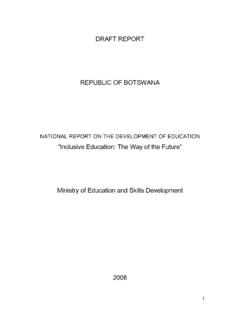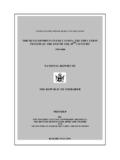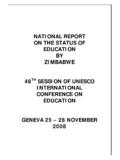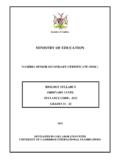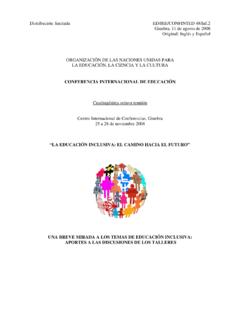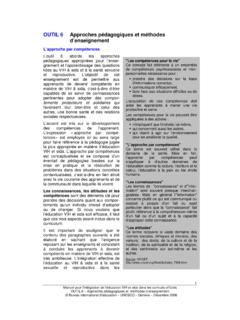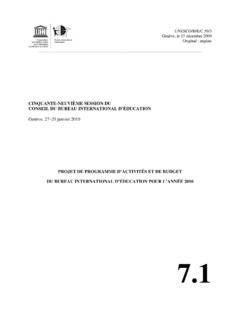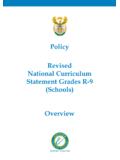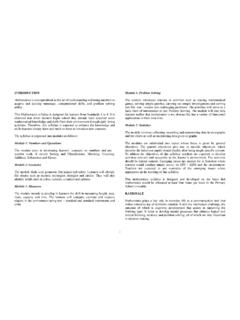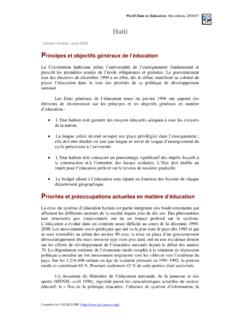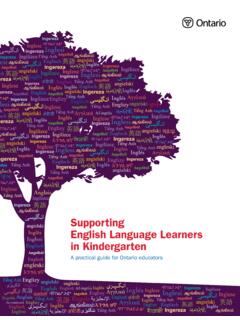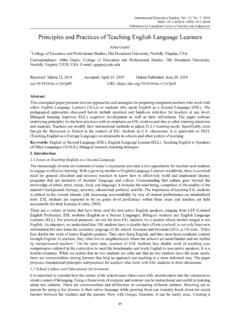Transcription of INTERNATIONAL BUREAU OF EDUCATION
1 INTERNATIONAL BUREAU OF EDUCATION Reaching Out tO all learners : a Resource Pack for Supporting inclusive EducationTraining Tools for Curriculum Development INTERNATIONAL BUREAU OF EDUCATION Reaching Out tO all learners : a Resource Pack for Supporting inclusive EducationTraining Tools for Curriculum Development4 The information provided in the material and case studies does not necessarily represent the views of the IBE-UNESCO. The designations employed and the presentation of the material, including maps, do not imply the expression of any opinion whatsoever on the part of the IBE-UNESCO concerning the legal status of any country, territory, city or area, or of its authorities, or concerning the delimitation of its frontiers or are granted permission to reproduce or translate short extracts, provided that the source is acknowledged: print out hard copies for personal use, provided that it is not for the purpose of private or commercial gain.
2 The IBE-UNESCO cannot undertake responsibility for any subsequent use of the material, or the accuracy of the information provided. The IBE-UNESCO strongly recommends establishing hyperlinks to the present material instead of using and posting it on any other website for any purpose, and does not encourage the posting of PDFs on other websites in the absence of a previous agreement. Hyperlinks to other websites are provided for the user s convenience. The IBE-UNESCO does not control or guarantee the accuracy, relevance, timeliness or completeness of this outside information. The inclusion of hyperlinks to other websites is not intended to reflect their importance, nor is it intended to endorse any views expressed, or products or services offered, on these sites, or the organizations maintaining the sites.
3 Further, the brief description of the information and services provided on outside sites is not exhaustive and does not represent an evaluation of these sites on the part of the in Geneva, January 2016 1991211 Geneva 20 SwitzerlandTel.: + : + : IBE/2016/OP/CD/01 Training Tools for Curriculum Development Reaching Out to All learners : a Resource Pack for Supporting inclusive EDUCATION INTERNATIONAL BUREAU of EDUCATION -UNESCO (IBE-UNESCO), in 1925 in Geneva, the INTERNATIONAL BUREAU of EDUCATION (IBE) was fully integrated into UNESCO in 1969. Currently, its core mandate is the strengthening of capacities of Member States EDUCATION systems for equitable and inclusive delivery of quality and development-relevant EDUCATION as well as effective lifelong learning opportunities for all.
4 This mandate is fulfilled in partnership with national governments, INTERNATIONAL organizations, NGOs, academic institutions, and other relevant stakeholders. As a global Centre of Excellence in Curriculum and related matters, the IBE is valued for its: expertise and cutting edge knowledge in curriculum, teaching, learning and assessment; leading role in global dialogue and advocacy for curriculum and related matters; normative and standard setting role in its areas of competence; innovation and laboratory of ideas in curriculum and related matters; evidence-based expert advice on policy and practice; global networks and communities of practice; professional and institutional development opportunities and rich EDUCATION resources accumulated over many years.
5 Over the medium term, the IBE will support Member States and its key partners by focusing on the following operational programmes that align well with its core functions: Innovation and Leadership in Curriculum and Learning; Critical Issues in Curriculum and Learning; Knowledge Creation and Management in Curriculum and Learning; Systemic Strengthening of Quality and Development-Relevance of EDUCATION and Learning; Leadership for Global Dialogue on Curriculum and Learning; and Institutional and Organizational Development. inclusive EDUCATION is an over-guiding principle of the 2030 EDUCATION Agenda embodied in the SDG4 Ensure inclusive and equitable quality EDUCATION and promote lifelong learning opportunities for all.
6 In-clusive EDUCATION is at the core of the transformation of EDUCATION and of EDUCATION systems. It entails building upon the uniqueness of each learner and providing a personalized learning opportunity. The IBE is therefore well positioned to support Member States and other key partners to effectively implement Sustainable Development Goal 4 (SDG4). The IBE series of Training Tools for Curriculum Development: a Resource Pack is designed to support Member States with regard to EDUCATION and curriculum reforms and development processes. Specifically, Reaching Out to All learners : a Resource Pack for Supporting inclusive EDUCATION intends to share this broader un-derstanding of the theory and practice of inclusive EDUCATION to support its effective implementation at the school and classroom levels.
7 It provides comprehensive guidance for national policy makers, curriculum specialists and developers, teachers, teacher educators, school leaders and district level would like to express our special thanks to Renato Opertti (coordinator) and Mel Ainscow (consultant) for their contributions to the development of the Reaching Out to All learners : a Resource Pack for Supporting inclusive would also like to extend our thanks to the reviewers of the Resource Pack: Mar a Klara Ortiz Karam (Colombia), Humberto Rodr guez (Mexico), Cecilia Roso (Uruguay) and Kenneth Wontumi (Ghana). The content of this work has been enriched by their comments and would like to extend special gratitude to the director of the IBE, Dr. Mmantsetsa Marope, without whose unconditional support and constructive advice, the preparation and publication of this resource pack could not have been facilitated.
8 A warm thank you also goes to the IBE colleagues who have contributed to the revision and edition of this Resource Pack: meline Brylinski, Lili Ji, Hyekyung Kang, Juliette we have unintentionally omitted anyone who has collaborated without giving them their due recognition, we apologize and offer our most sincere gratitude for their invaluable assistance. 7tAble oF contentsForeword ..5 Acknowledgements ..6 Table of Contents ..7 Introduction ..8 Guide 1. Reviewing National Policies ..11 Introduction ..12 National Guide Reading 1: Concepts ..20 National Guide Reading 2: Policy ..26 National Guide Reading 3: Structures and systems ..32 National Guide Reading 4: Practice ..38 Guide 2. Leading inclusive School Development ..45 Introduction ..46 Workshop 1: Everyone is made to feel welcome.
9 52 Workshop 2: Students are equally valued ..56 Workshop 3: There are high expectations for all students ..64 Workshop 4: Staff and students treat one another with respect ..72 Workshop 5: There is a partnership between staff and families ..78 Workshop 6: The school is accessible to all students ..84 Workshop 7: Senior staff support teachers in making sure that all students participate and learn . 92 Workshop 8: The school monitors the presence, participation and achievement of all students .. 100 Guide 3. Developing inclusive Classrooms ..107 Introduction ..108 Workshop 1: Teaching is planned with all students in mind ..112 Workshop 2: Lessons encourage the participation of all students ..122 Workshop 3: Students are actively involved in their own learning ..130 Workshop 4: Students are encouraged to support one another s learning.
10 138 Workshop 5: Support is provided when students experience difficulties ..146 Workshop 6: classroom discipline is based on mutual respect and healthy living ..152 Workshop 7: Students feel that they have somebody to speak to when they are worried or upset ..158 Workshop 8: Assessment contributes to the achievement of all students ..162 References ..170 Appendix 1 ..172 Appendix 2 ..1748 The Incheon Declaration which resulted from the World EDUCATION Forum held in May 2015 has given new impetus to INTERNATIONAL efforts for promoting EDUCATION for All. It reaffirms the vision of the worldwide movement initiated in Jomtien in 1990 and reiterated in Dakar in 2000 - the most important commitment to EDUCATION in recent decades, that has helped significant progress in EDUCATION .
